Voluntary Notification of Labeling Changes for Masks with Magnets
November 2023: In 2022, Philips Respironics voluntarily updated the contraindication and warning labeling for masks with magnets. As an industry-leading practice, we strengthened the already present warnings and added contraindications for individuals who have, or are in close proximity to, a metallic implanted device. Below is the original communication.
September 2022: Philips Respironics has a range of mask options available, with and without magnets, designed to help support overall experience and comfort. However, if you, or someone you are in close proximity to, have an implanted metallic device, you should talk to your clinician about what your mask options are. As an industry-leading practice, Philips Respironics has voluntarily updated the contraindication and warning labeling for masks with magnets. All individuals, who have, or are in close proximity to, a metallic implanted device, should read and follow Philips Respironics’ updated warning and added contraindications described below.
What is Philips Respironics’ notification for masks with magnets?
This is a voluntary notification to inform users of specific sleep therapy masks containing such magnetic components of the updated instructions and labeling. The already present warnings have been strengthened and contraindications have been added. Use of the mask is only contraindicated for patients and their household members, caregivers and bed partners that may be in close vicinity to patients using the masks, that have implanted metallic medical devices/metallic objects that may be affected by magnets. These masks may continue to be used according to the updated instructions and labeling if patients or people in close proximity to them do not have implanted metallic medical devices or metallic objects in the body.
What is a Contraindication vs. a Warning?
A contraindication is a condition under which the device should not be used because the risk of use clearly outweighs any possible benefit. A warning alerts the patients about a situation which, if not avoided, could result in death or serious injury. Additionally, a warning may also describe potential serious adverse reactions and safety hazards. In short, a contraindication tells the user when a device should not be used, and a warning tells the user how to avoid sources of harm in the use of the device.
Use of the mask is contraindicated for patients and their household members, caregivers, and bed partners that may be in close vicinity to patients using the masks, that have implanted devices that may be affected by magnets, including but not limited to:
Magnets with a magnetic field strength of 400 mT are used in the mask. With the exception of the devices identified in the contraindication, ensure the mask is kept at least 6 inches (approx. 15.24 cm) away from any other medical implants or medical devices that can be impacted by the magnetic fields to avoid possible effects from localized magnetic fields. This includes household members, caregivers, and bed partners that may be in close vicinity to patients that use the masks.
Masks with magnets include:
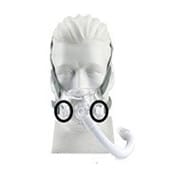
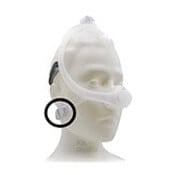
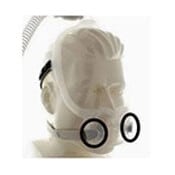
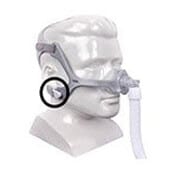
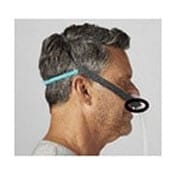
Questions and answers
Why is Philips Respironics issuing this notification?
This is a voluntary notification to users of specific CPAP or Bi-Level PAP therapy masks containing magnets to inform them of the updated instructions and labeling, including the strengthened warning and added contraindication. Patients should only stop using the masks with magnets if the implanted metallic medical device/metallic object is contraindicated against the mask magnets. These patients should consult their physician immediately to determine if another mask can be used for their therapy.
Can I continue to use Philips Respironics’ masks?
Yes, these masks may continue to be used according to the updated instructions and labeling if patients or people in close proximity to them do not have implanted metallic medical devices or metallic objects in the body.
The magnetic headgear clips are used to attach the headgear straps to the masks, which is a method that is commonly used in the sleep therapy devices industry. Such magnetic clips are also used in the wearable electronics industry.
Patients should only stop using the masks with magnets if the implanted metallic medical device/metallic object is contraindicated against the mask magnets. These patients should consult their physician immediately to determine if another mask can be used for their therapy.
Does Philips Respironics’ portfolio also include masks that do not contain magnetic components?
Yes, Philips Respironics’ portfolio also includes sleep therapy masks that do not contain magnets.
If I have a mask with magnets, and have, or are in close proximity to someone with, an implanted metallic device, what could I use instead?
*You will need to consult with your clinician in order to determine the best mask for your needs, as these masks are medical devices that require a prescription.
Will Philips Respironics continue to distribute masks with magnets?
Yes, following the implementation of the updated instructions and labeling, Philips Respironics will continue to distribute masks with magnets.
What will Philips Respironics do to support affected patients?
Affected patients may contact their equipment provider if a replacement mask is needed. Philips Respironics is working with these equipment providers and intends to provide them with replacement masks without magnetic components for patients affected by the added contraindications. If there are additional questions about the contraindication and warning statement, you can call Philips Respironics’ customer service at 877-387-3311 (Monday – Friday, 8:30 AM ET to 5:00 PM ET).
What is the potential risk of serious injury that Philips Respironics is warning about?
Use of the mask is only contraindicated for patients and their household members, caregivers and bed partners that may be in close vicinity to patients using the masks, that have implanted metallic medical devices/metallic objects that may be affected by magnets. More than 17 million masks containing magnetic clips have been distributed by Philips Respironics to date. As of September 2022, Philips Respironics has received 16 reports of patients suggesting that the mask magnets may have impacted their medical devices including pacemaker interference, pacemaker failure leading to replacement, need of shunt adjustment, resetting of automatic implantable cardioverter defibrillator, seizures, defibrillator shutting off periodically, arrhythmia, irregular blood pressure, change in heartbeats, and cognitive issues. Philips Respironics has not received any reports of patient death in connection with this matter.
